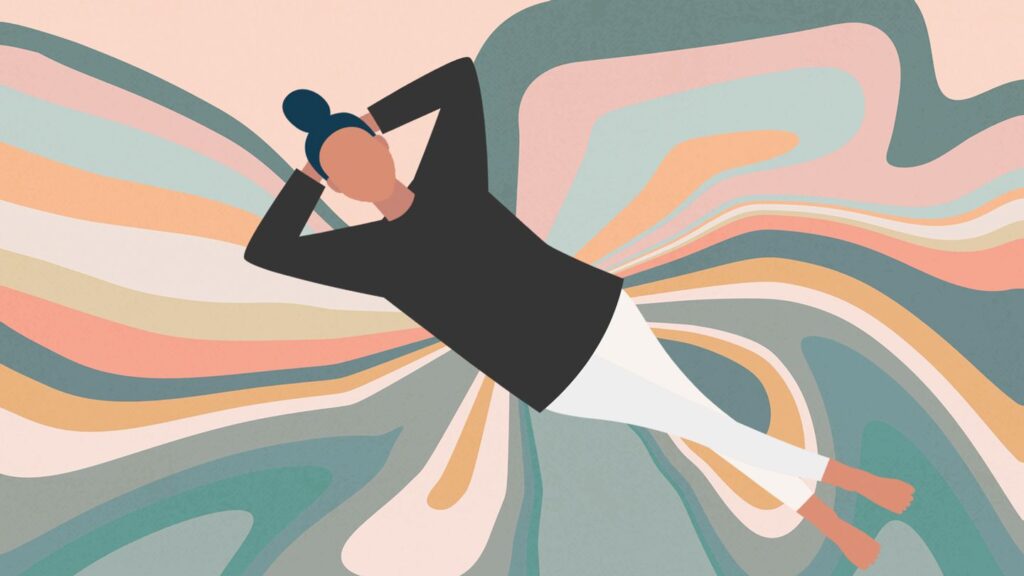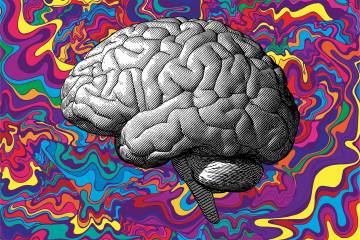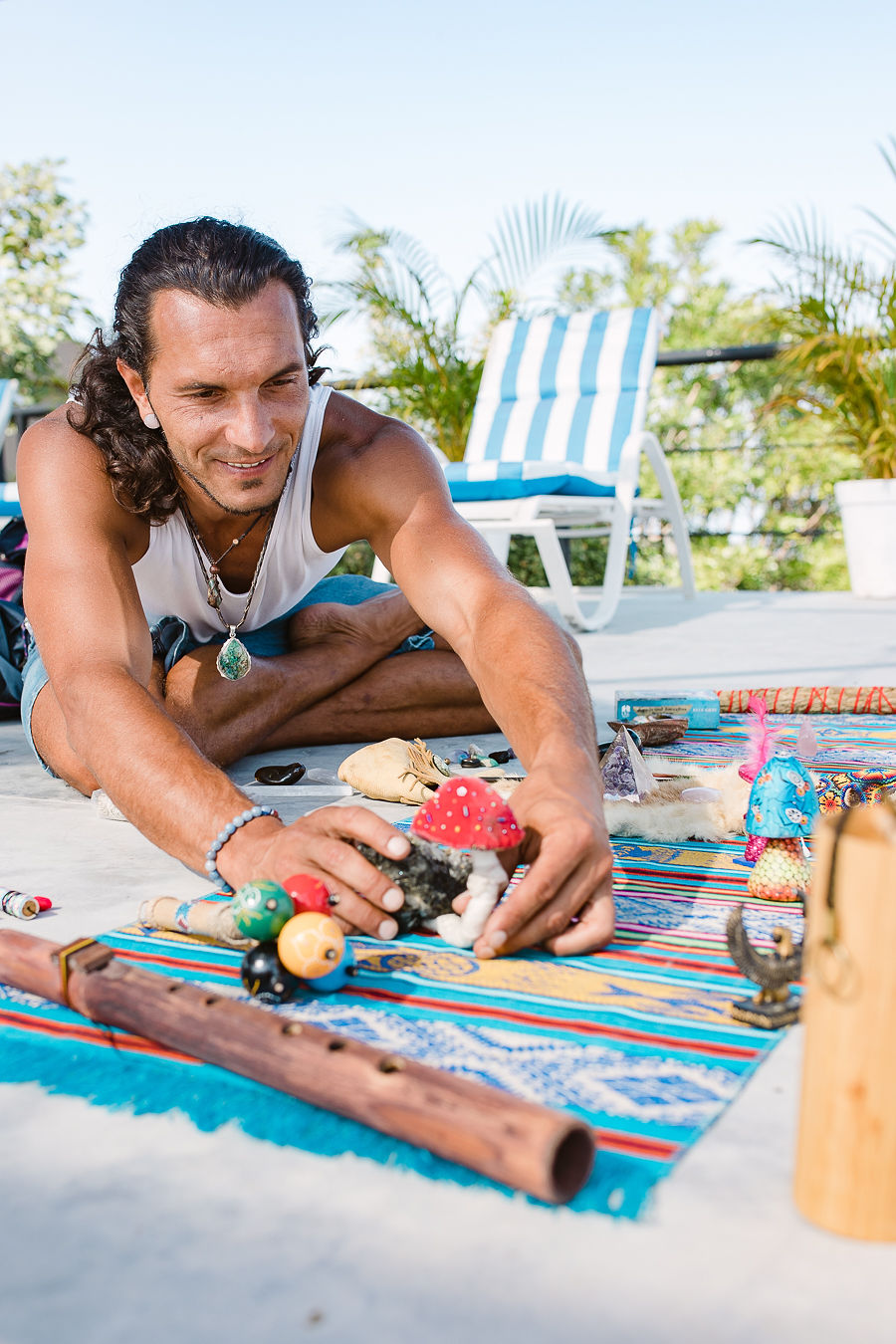The way we’ve treated depression is due for a change.
SSRIs, selective serotonin reuptake inhibitors, have become the default prescription for sadness, anxiety, grief, and trauma. But for nearly one-third of people, they simply don’t work. For many others, they come with a high emotional cost: numbness, loss of libido, and a disconnection from self that feels more like surviving than truly living.
I know this story because I’ve lived it.
And I’ve sat across from hundreds of people who’ve told me, often through tears, “I did everything I was supposed to. Therapy, medication, wellness podcasts, but I still feel lost.” For those people, and for anyone seeking a deeper, more embodied path to healing, psilocybin is a beacon.
The surge in interest around psilocybin is driven by a few viral documentaries and rigorous clinical research from institutions like Johns Hopkins and Imperial College London. We’re beginning to ask new questions.
What if healing isn’t about numbing symptoms but feeling through them?
What if the path out of depression isn’t found in a daily pill?
How can we craft a well-supported, transformational experience for those working through depression?
In this article, I’ll walk you through the key differences between psilocybin and SSRIs—how they work, what the science says, and why so many people are finding profound relief with mushrooms where medication fell short.
SSRIs 101: How They Work and What They Miss

Let’s start with the basics. SSRIs, like Prozac, Lexapro, and Zoloft, are designed to increase the amount of serotonin available in your brain. They do this by blocking its reabsorption (or “reuptake”), essentially keeping more of it floating around in your synapses
The theory is that more serotonin equals a better mood.
In practice, it’s a slow and unpredictable process. Most people are told to wait several weeks, sometimes months, before noticing improvement. And even then, the effects are inconsistent. For many, it’s like trying to fix a leak in your roof with duct tape. It might hold for a while, but the deeper damage is still there.
Another major oversight?
SSRIs are often prescribed without any therapeutic support. There’s no emotional scaffolding, no framework for understanding why you’re depressed in the first place, just a chemical tweak and a hope for the best. Over time, this can lead to emotional flattening.
I’ve heard countless guests say things like, “I didn’t feel sad anymore, but I didn’t feel anything at all.”
Sexual dysfunction is another common and distressing side effect. Low libido, difficulty with arousal, and anorgasmia (inability to orgasm) are rarely talked about in the doctor’s office. Still, they’re very real, and deeply tied to our sense of identity and connection.
And then there’s the dependency.
Missing even a couple of doses can trigger withdrawal symptoms, brain zaps, mood swings, flu-like symptoms, and rising anxiety. I’ve sat with people sobbing, not from sadness, but from the fear that if they stop their medication, they’ll have nothing left.
That’s a terrifying place to be.
Psilocybin Explained: A Very Different Approach
Psilocybin, the naturally occurring compound found in certain species of psychedelic mushrooms, offers a radically different approach to healing depression, one that doesn’t involve daily dosing, emotional numbing, or waiting weeks for a subtle shift. Instead, psilocybin works quickly, deeply, and often profoundly.
Rather than blocking the reuptake of serotonin like SSRIs do, psilocybin binds directly to the 5-HT2A receptors in the brain.
This is where the magic and mystery begin.
This interaction not only amplifies serotonin’s activity but also sparks a cascade of neurological effects that can lead to a sense of clarity, connection, and emotional catharsis. For many, it feels like stepping outside the fog of depression for the first time in years.
One of psilocybin’s most exciting mechanisms is its ability to enhance neuroplasticity, the brain’s innate capacity to form new connections and pathways. This is especially powerful for those caught in the repetitive, self-defeating thought loops that often accompany depression. In a psilocybin experience, the brain can quite literally “rewire,” opening up new perspectives, emotional flexibility, and behavioral change.
And here’s the part that continues to astonish researchers. These effects don’t take months to appear. People often feel significant shifts after just one or two sessions. Not because their symptoms were numbed, but because something deeper was released.
The Research Is In: Psilocybin vs SSRIs for Depression
Landmark 6-Month Study: Psilocybin Outperforms Escitalopram
I’ve learned to trust what I’ve seen in the eyes of our guests, joy returning, hope rekindled, and clarity where there was once chaos. But now, science is catching up with what we in the psychedelic healing space have known all along.
One of the most groundbreaking studies to date was conducted by Imperial College London, comparing psilocybin with escitalopram (Lexapro), a widely prescribed SSRI. Over six months, both groups showed comparable reductions in depression scores.
Participants in the psilocybin group reported significantly greater improvements in areas that matter deeply to human wellbeing.
- A sense of meaning in life
- Emotional and social connectedness
- Functional outcomes like job performance and motivation
In other words, psilocybin didn’t just make people “less depressed”, it made them more alive.
Even more promising? The side effect profile.
While those on SSRIs reported the usual suspects. Sexual dysfunction, emotional flatness, fatigue, those in the psilocybin group experienced fewer adverse effects, and many reported enhanced self-awareness, greater emotional depth, and a restored sense of agency.
And this isn’t an isolated finding.
Research from Johns Hopkins, NYU, and numerous peer-reviewed journals continues to reinforce the same themes: psilocybin has the potential to not just match but surpass SSRIs in both clinical outcomes and quality-of-life improvements.
For too long, the bar for “treatment” has been symptom reduction. But what if the goal wasn’t just to feel less bad, but to feel deeply well? That’s the difference psilocybin is offering. And for many of our guests at The Buena Vida, it’s not just a statistic—it’s a second chance at life.
How Psilocybin Works in the Brain (And Why It Matters)

Beyond Serotonin: Glutamate, Default Mode Network, and Neuroplasticity
Both affect serotonin pathways, but psilocybin goes well beyond them, engaging multiple systems that directly impact how we think, feel, and change.
One of the most exciting discoveries in recent years is psilocybin’s ability to increase glutamate, the brain’s primary excitatory neurotransmitter.
Why does that matter?
Glutamate is essential for learning, memory, and rewiring your neural connections. In other words, psilocybin doesn’t just make you feel better temporarily—it may help you become better at feeling, thinking, and responding to life in a whole new way.
Default Mode Network
Another key player is the Default Mode Network (DMN), a cluster of brain regions associated with self-referential thinking, often overactive in people with depression and anxiety. This is the part of your brain that loops thoughts like “I’m not enough,” “Things will never change,” or “It’s all my fault.”
Psilocybin temporarily quiets this network, which can feel like the volume knob on self-criticism has been turned down, or even silenced entirely.
This “loosening” of the DMN creates space for new perspectives, spontaneous insights, and emotional breakthroughs. People often describe it as stepping outside themselves—seeing their life, their pain, their patterns, from a higher vantage point.
This is where neuroplasticity kicks in, allowing you to not only recognize different possibilities but to begin living into them.
The Psilocybin Advantage: Deep Emotional Healing
I’ve sat with so many courageous souls in ceremony. Here’s one thing I’ve discovered. Healing isn’t about symptom management. It’s about reconnection. Psilocybin doesn’t just reduce sadness or quiet anxiety. It invites you into a space where you can feel, release, and reclaim what’s been buried beneath the surface.
Many of our guests arrive carrying grief, shame, anger, or trauma that’s been locked away for years.
During their journey, with the support of our facilitators and an intentionally crafted setting, these emotions begin to rise—gently, and often powerfully. We witness cathartic emotional releases that don’t just relieve pressure—they clear space. For truth. For love. For peace.
Unlike SSRIs, which often mask symptoms or make pain feel distant, psilocybin helps people confront the root causes of their suffering. Not in a way that retraumatizes—, ut in a way that empowers. When you face your pain in a safe space, with community and guidance, something miraculous happens: your fear gives way to understanding, and your resistance turns into relief.
Community, Connection, and Meaning
One of psilocybin’s most profound gifts is that it reconnects us, not only to our inner selves, but to others, to purpose, and to the world around us. I’ve watched people who felt broken and alone suddenly remember what it feels like to laugh deeply, cry freely, and feel completely seen.
In our retreat setting, this happens not in isolation, but in community.
Guests often arrive feeling disconnected from family, friends, even from themselves. But through shared vulnerability, story, ceremony, and music, they rediscover a sense of belonging that’s impossible to replicate in a sterile clinical environment or a one-size-fits-all prescription.
Again and again, I hear a phrase that never loses its impact: “This made life feel worth living again.”
That’s not hyperbole.
That’s the voice of someone who’s tasted what it means to feel alive—not just less depressed. And it’s a reminder that true healing isn’t just about removing pain. It’s about rediscovering joy. Finding meaning. And remembering that you are, and have always been, connected.
Is Psilocybin Safe?
Safety is always the first question we get from new guests, and rightfully so. Here’s what the research (and our experience with over a thousand guests) tells us. Psilocybin is remarkably safe when used responsibly and in a supported setting.
From a physiological standpoint, psilocybin has extremely low toxicity.
In fact, studies have shown it to be safer than caffeine and alcohol. It doesn’t impact your heart rate or blood pressure in any dangerous way, and there’s no risk of physical addiction or chemical dependency. Unlike prescription medications, there’s no tapering required and no withdrawal symptoms if you don’t “stay on” it.
How Long Should I Be Off SSRIs Before a Trip?
Being on SSRIs can blunt or even block the effects of psilocybin.
Anecdotally, we’ve found that being off SSRIs for at least 2–3 weeks tends to result in stronger, more emotionally connected journeys. That said, our general recommendation is more conservative. In partnership with your healthcare provider, we advise pausing SSRI or SNRI medications for 1–3 months before attending one of our retreats. This gives your system time to recalibrate and your serotonin receptors space to recover.
We want to be clear, we are not medical providers, and our programs are not a substitute for psychiatric care. We don’t treat, cure, or diagnose any conditions, and we never advise tapering or stopping medication without the guidance of a licensed physician.
What we do offer is a safe, supportive space where the medicine can work as intended, without interference, without suppression, and with your full presence. Every guest undergoes a thorough medical screening to ensure not only their safety, but the well-being of the entire group. In some cases, we can consider guests on very low doses of SSRIs, but this is evaluated case by case.
The Buena Vida Difference: A Pathway to Real Healing
We’ve had the honor of guiding more than 1,000 guests through deeply transformational psilocybin experiences.
These are not recreational trips.
They’re structured, trauma-informed journeys rooted in both clinical research and ancient wisdom, designed to reconnect you to the parts of yourself that may have been silenced by depression, trauma, or years of numbing.
What makes us different isn’t just the medicine, it’s the container we build around it.
From pre-retreat preparation and personalized screening to integration circles and somatic support, we walk with you before, during, and after your journey. This isn’t about escaping your life for a weekend. It’s about stepping into it more fully than you ever have. Again and again, we hear from guests who say, with full sincerity.
“This saved my life.”
So how do you know if this path is right for you?
If SSRIs haven’t worked, or if they’ve left you feeling disconnected from your own emotions.
if you’re tired of surviving and ready to start living again
If there’s a part of you whispering that there must be more.
You’re not alone. And you’re not wrong. Psilocybin doesn’t promise an easy way out, but it can offer a doorway in—into meaning, into connection, into yourself.
I hope this reflection of two fundamentally different philosophies of healing provided value.
SSRIs may dull symptoms. Psilocybin, when approached with care and intention, can transform your relationship to the root of those symptoms. For some, that difference is the bridge between despair and hope. Between dissociation and belonging. Between a life managed… and a life reclaimed.
📍 Ready to explore the difference?


